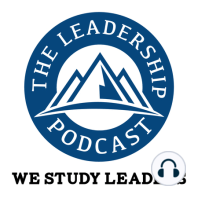34 min listen
TLP039: Humanizing Our Workplaces
ratings:
Length:
49 minutes
Released:
Mar 22, 2017
Format:
Podcast episode
Description
Summary & Ideas for Action Co-hosts Jan Rutherford and Jim Vaselopulos interview Liz Ryan - the CEO and founder of Human Workplace. According to Liz, the mistrust of employees is baked into organizations. Liz says, “It’s toxic, it’s sick, and it’s bad for profitability, for shareholders, for employee health, and the planet.” Liz advocates that leaders need to “be human,” and to make every workplace a human workplace. Trust your people. Liz considers infrastructure, control mechanisms, and performance appraisals, to be disgusting. She says It’s a bad message: “You are not a fully fledged, adult, independent, creative, vibrant, amazing person, when you’re at work.” Listen in to learn more about humanizing our workplaces. Key Takeaways [1:51] Liz waited tables while in school. She dropped out, moved to Chicago, and found she was too young to wait tables in Illinois. She became an office worker, and later moved into HR, with no experience. HR workshops and seminars taught her the laws, but she felt that HR practices did not create a great working environment, or take really good care of employees and applicants. [3:38] In her first HR job, Liz’s efforts to improve the workplace and hire great people accompanied a growth in annual sales from $1 million to $200 million. Her second HR job was with a tech startup. While she was there, the company grew from $15 million in annual sales, into a $3 billion company. [6:21] Liz objects to the theory of HR’s and leaders’ roles being to guard against bad things that could potentially happen, rather than to hire people who are unlikely to do bad things. The mistrust of employees is baked into organizations. It’s toxic, it’s sick, and it’s bad for profitability, for shareholders, for employee health, and the planet. Liz calls this entrenched system Godzilla. [9:54] Be human. Make every workplace a human workplace. Trust your people. Liz considers infrastructure, control mechanisms, and performance appraisals, to be disgusting. It’s a bad message: “You are not a fully fledged, adult, independent, creative, vibrant, amazing person, when you’re at work.” [10:58] The transactional nature of employment can obscure the real rewards beyond the check. If employees are paid fairly decently, they appreciate different motivations, such as intellectual growth and creative challenges. People need to connect to their own power source, whatever that is. Work can be art. See Liza’s article on rewarding employees for free. She wrote it in response to multiple requests. [14:30] Liz sees a paranoia, that when we let employees work from home they’re going to be watching daytime soaps and eating bonbons. In 2017, we are using an 1850s employment model of a factory with supervisors watching from a catwalk, as in a prison — it is hierarchical, bureaucratic “terror.” [17:35] The fix is to embrace your power. You can choose another job. You can speak up, or hold your tongue, because you choose to, not out of fear. Whether you are entry-level, or in the C-suite, you have the power to create a human workplace around you. That is adulthood. You are the CEO of your own life. [19:39] Liz says you must understand your path, and get that vision of what your life is supposed to be. For her, focusing on what you want, and where you are going, is not about sacrifice, but about choice and determination. Really listen to your gut and your heart, and follow them. Take a step every single day. Come out of your comfort zone. [21:50] Liz tells how she found her voice. She was shot down for using calligraphy on internal mail. She got no answers for questions about the roles of men and women at work. She asked questions in her HR role that had no handbook answers. She felt so strongly about things, that she just started speaking out. The job is to be a human, not a bureaucrat. Liz did HR from the heart, organically, and in the moment. [32:27] The story of Kitty Genovese’s murder, where 37 witnesses didn’t act, is compared to the wo
Released:
Mar 22, 2017
Format:
Podcast episode
Titles in the series (100)
TLP007: A Team Approach to Mending Our Nation’s Healthcare Crisis with Mike Biselli: Finding inspiration and innovation by integrating the ideas of corporations and entrepreneurs. by The Leadership Podcast
